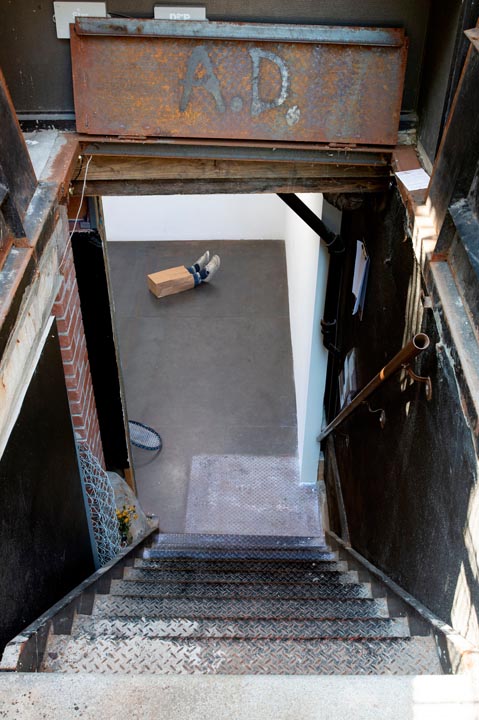OFLUXO
Interregnum – Paco Chanivet
@ Espai 13 – Fundació Joan Miró
Jul 07 – Sep 08, 2019

Interregnum draws inspiration from the sense of cosmic horror to transform the Espai 13 into a room of strangeness, imbuing visitors with a feeling of helplessness when they encounter the composite of invasive, jealous, conflicting forces arising from the powers that surround them and from their own psyches. The exhibition seeks to address the boundaries of what is human, allowing us to glean a spectral, intermediate, nebulous, terrifying universe in which humanity has been removed.






“It was a place of strange interferences, of infinite disquiet and melancholy, the eternal residue of some cosmic tragedy.”
Thomas Ligotti
The space is covered by a sea of rubble from arid ruins where life has no place. In spite of this, weird flowers sprout from the wreckage of a reality that has just been dynamited and transformed into The Desert of the Real. These flowers are like fractal organisms that have survived and adapted to some kind of disaster. A plague of terrible organisms in an exclusion zone where the laws of biology are deformed.
To stand in this desert is like being in the middle of a reality that we believe to be comfortable and understandable, yet in which there is a massive breach. The rubble, the machine, the flowers appear through that breach, sinister and uncomfortable, bursting through the surface of what is familiar to us.




On the other side of the room, a glimpse of an inaccessible dimension. This is the thing that can’t be named: The Cloud of Unknowing, the only way we can perceive the unthinkable, inaccessible and unknowable world whose dimensions we can’t even begin to imagine, given that our cognitive system collapses. We are only allowed to see that total exteriority through the small breach that has opened up in what is familiar. Through it we can sense the most ancient and absolute horror, the horror that occurs when faced with the emptiness of what we will never know because of our limitations, and that we can’t define because we don’t know how. The vertigo of the unfathomable versus the obsolete machine of human knowledge. The universe itselfversus the universe as we see it, the one we believe to have domesticated through our naive, anthropocentric vision.
That which can’t be named or grasped can’t be described either. That’s why, during the inauguration, an empty-eyed guardian blinds the cameras on our mobile phones, our main tools for describing reality, with the stealthiness of the word «adiaphora» (from the Greek διά διάφοροςφορος, «indifferent»).
Interregnum is an atmospheric experience that responds to the category that cultural theorist Mark Fisher describes as “the weird and the eerie”. The weird as a strange juxtaposition of elements that shouldn’t be there, an abnormal combination of familiar elements. Weirdness, that discrepancy of reality, places us in the presence of something new that we feel is untrue. However, the error isn’t located in reality but in our conception of reality—or what we project as such. This error is the indication that our rules no longer work. At the same time, a horrifying feeling arises if we ask ourselves: who (or what) produced this divergence between what we believe our reality is and reality in itself?







Our reality is an increasingly unthinkable and unknowable world, in which imminent disasters, climatic change or pandemics, caused or not by the machine of human existence, bring the planet inexorably closer to what the philosopher Eugene Thacker calls “the world without us”. This speculative world is “a bestiary of impossible life forms” that we can’t imagine, describe or interpret, and that is why the mind always tries to return to a territory with rules governed by reason.
The effort exerted by reason is hindered in Interregnum, which functions as a cognitive defamiliarisation chamber, as in the weird fiction genre. By descending into this cosmic basement and glimpsing the horror of the unnameable, the visitor-victim experiences a defamiliarisation of the world that forces them to learn the rules that govern this new reality, as they go immersing themselves in it. They also face the fact that the universe, as well as being hostile, is indifferent to our fate. Here the interregnum (a political period without a sovereign or when normal government is suspended) is ontological: in the collapse of civilization, what exists hardly responds to known rules, but we begin to perceive what is to come. Through the breaches in our present, what can’t be named begins to seep through, the great yawn of the universe without us. As Lovecraft once wrote: “Common human laws and interests and emotions have no validity or significance in the vast cosmos-at-large.”
Pilar Cruz














Interregnum
Paco Chanivet
From 5 July to 8 September 2019
Espai 13, Fundació Joan Miró – Barcelona
Part of ‘A Monster Who Tells the Truth’ – Exhibition series curated by Pilar Cruz
Photography by Mathius de Felipe and Arnau Oriol.
Fundació Joan Miró
Previous Articles
OFLUXO is proudly powered by WordPress






